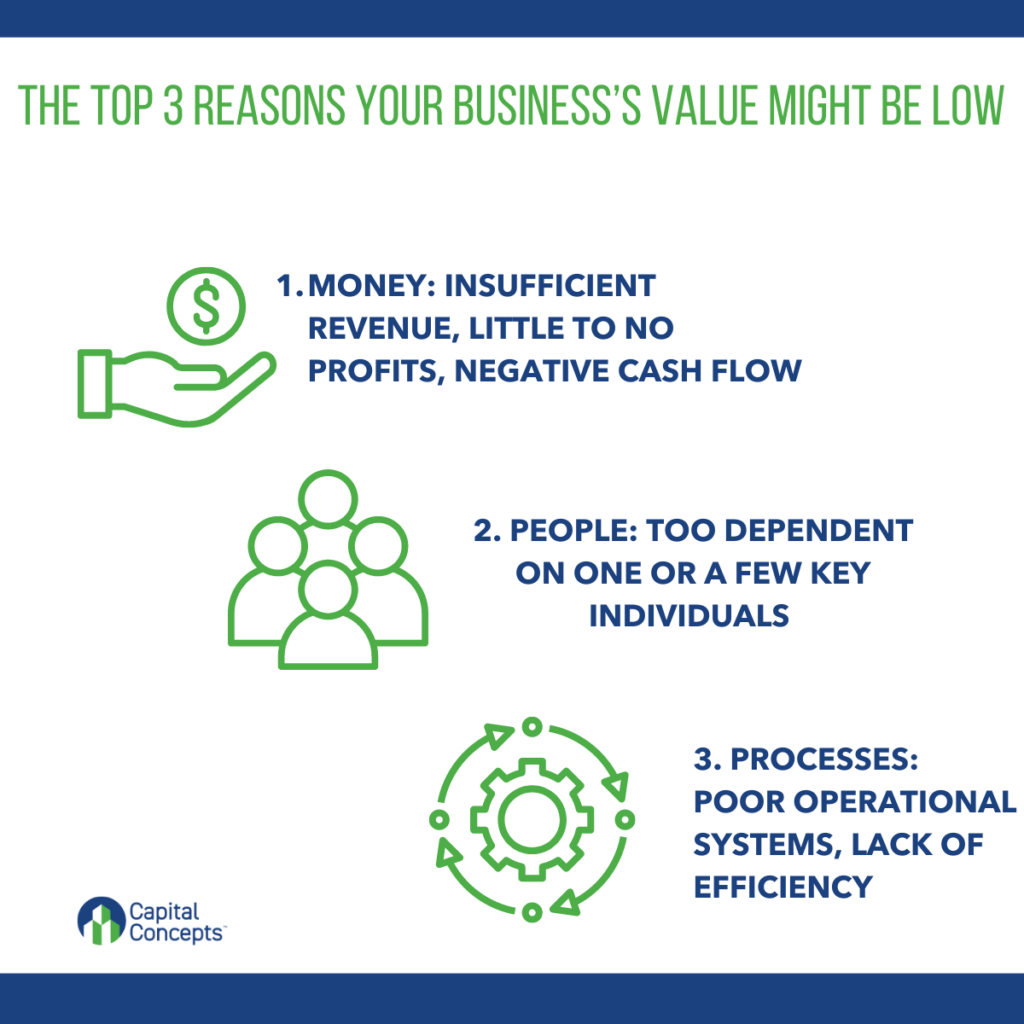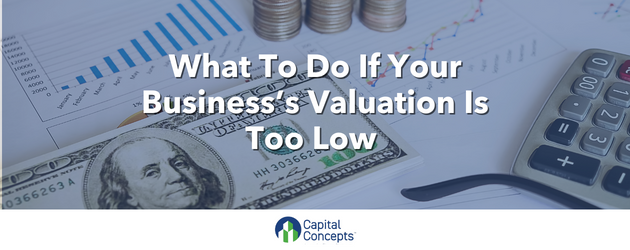Business owners tend to overestimate the value of their business, which can mean an unpleasant surprise when a valuation expert delivers their assessment. This can be a painful experience, but it’s necessary to define exactly where you are today (point A). Without this, you cannot make a plan that will get your business and yourself to point B – a successful exit. (In case you missed it, we discussed the formula for a successful exit in an earlier article.)
The Consequences of Overestimating Your Business’s Valuation
Many people start a business so they don’t have to work for someone else. They often experience it as a job replacement, and they never get out of that mode. With this mindset – running the business primarily to support their life – they drift into what’s called “a lifestyle business” once they start earning a decent income. They don’t put much thought into building the infrastructure, processes, or scalability that buyers are looking for and therefore do not create much transferrable value.
As Jim Schleckser, CEO of the Inc. CEO Project, writes in his article, “You Run a Lifestyle Company. That’s OK.”:
When I have conversations about entrepreneurial companies with bankers, it’s pretty common to hear the bankers look down on some businesses as “just a lifestyle business.” The bankers are saying that the company isn’t growing fast enough for them to consider investing in or buying. In other words, if the company doesn’t have limitless growth potential, they’re not interested. … the big catch with a lifestyle business is that when it comes time for you to move on–maybe to retire or start something else–you won’t be able to sell a lifestyle business for the same kinds of multiples you could get for a growth business. You’ll leave money on the table compared with the entrepreneur who spent years prioritizing growth.
The problems with this approach become painfully visible when these owners think about retirement.
Here’s an example. Let’s say a business owner pulls $1 million each year out of their business to live on. That owner later sells the business for $10 million – sounds like a lot, right? However, even in a best-case scenario, that owner may only clear $6 million after paying the fees and taxes on the sale. Where can they invest their $6 million to yield $1 million per year? Nowhere. In order to clear $1 million per year and maintain their lifestyle, the owner must build that business large enough that it will sell for an amount that will clear $1 million per year for the rest of their life.
The bottom line is this: for most owners, what they think they have is not enough.
Reasons for a Low Business Valuation

If your business’s value comes in lower than you expected, dig into the assessment you receive along with that valuation to uncover why. Here are the most common reasons a valuation for a business is too low.
- Poor financial performance: If the business has been performing poorly in terms of revenue, profits, or cash flow, this could significantly reduce its value. Buyers may be hesitant to invest in a business that has not been generating consistent profits. This is one of the biggest reasons we see valuations come in lower than an owner expected. The good news is that with the right advisors and team, you can address these challenges, improve your business’s performance, and raise its valuation.
- Lack of growth potential: If the business has limited growth potential, a poorly-conceived business plan or a plan that ignores certain key factors that will doom its success, or operates in a saturated market, buyers may not see much potential. Without a probability of future growth which would pay a return on their investment, buyers will be unwilling to pay a high price.
- Dependence on key individuals: If the business is heavily reliant on you or a few of your key employees, buyers may be concerned about the risk of losing these individuals and the impact it could have on the business’s operations. This is very common, and you can address it in a couple of ways. You can put in the focused effort for a year or two to document what you know into repeatable processes that consistently produce good outcomes and train others to use them. Or you can tie the employees to employment contracts to keep them in place for a period of time so the buyer can rely on their presence during the transition.
- Poor operational systems: If the business has poor operational systems, this could make it less attractive to buyers who are looking for a business that can operate smoothly and efficiently. As mentioned in items 1 and 3 above, this is an area that is relatively straightforward to improve and is one we routinely assist businesses with.
- Legal or regulatory issues: If your business is facing legal or regulatory issues, this could significantly reduce its value, as buyers may be hesitant to take on these risks. We can recommend experts who can advise on how to resolve these.
- Competitive landscape: If your business faces intense competition or disruption from new technologies, buyers may be concerned about its long-term viability and may, therefore, be unwilling to pay a high price.
- Unrealistic expectations: It’s also possible that your expectations for the value of the business are simply too high. This can happen because you’re emotionally attached or have a different understanding of current market and industry trends.
- Market multiples: Unfortunately, business owners have no control over this. The current marketplace determines multiples, as well as how aggressively buyers are chasing businesses in the owner’s industry (or not). A strong, well-performing business put up for sale in a “cool” economy will always sell for less than one in a “warm” economy, even when they perform similarly. It’s almost impossible to time your sale with the market, so your best option is making sure your business always performs as close to peak as possible.
Steps To Improve a Low Business Valuation
We’ve got good news. It is possible to address any of these challenges. Given sufficient time (it may take a couple of years) and the right action, you will increase the value of your business and achieve your goals. This is why we recommend allowing yourself a few years to plan your exit.
We work with businesses whose owners are facing significant challenges in their effort to prepare for a successful sale. Our years of experience advising owners and their teams on how to optimize their approach and structure their business operations gives us invaluable insight into what will build value, improve performance, and end in a successful transition for you. We’ll spend the next several weeks delving into each of these areas and sharing lessons learned along the way.
If you’d like an assessment of your business and its readiness for sale, contact us for a complimentary review here!
Related Articles
How To Prepare for a Strong Business Valuation
You’ve been reading our series and have decided to do some exit planning. You’ve audited your time, started planning for your free time, and have an idea how much money you’ll need for the next chapter. Now it’s time to find out what your business is worth now, so you can create a plan to get it to the value you need it to be. This week’s article shares the information you need to gather for a professional valuation, and what to do if you don’t have that information ready.
Determining the Value of a Business
How do you determine the value of a business? We discuss four methods for determining value, along with the variables and complexities that valuation professionals must factor in. You can address some of these factors ahead of time to set yourself up for the best result.
Need Fresh Eyes On Your Business?
We offer complementary consultations to help you identify the areas where you could most quickly and easily improve your business’s performance, value, and profitability. Request one today.

